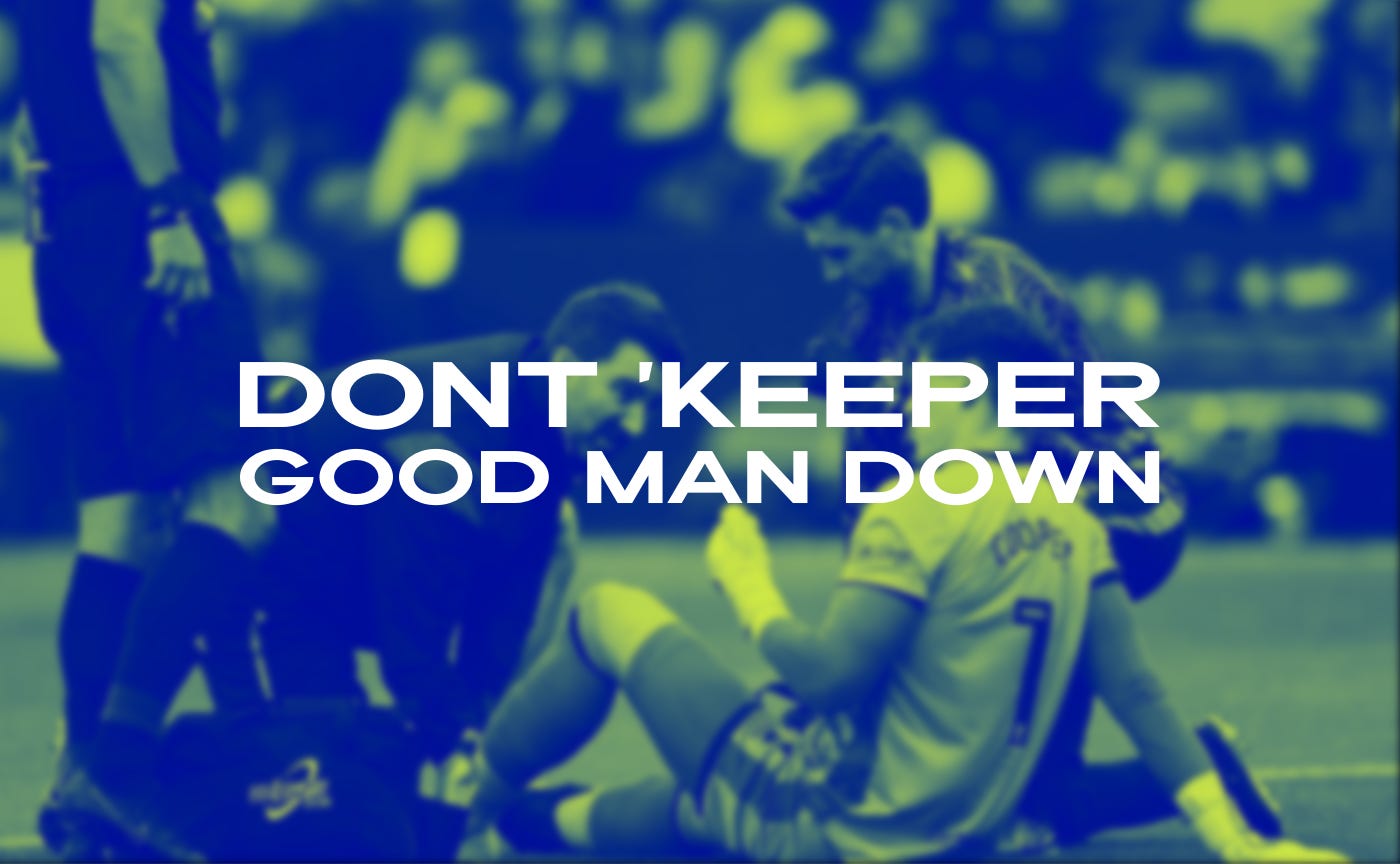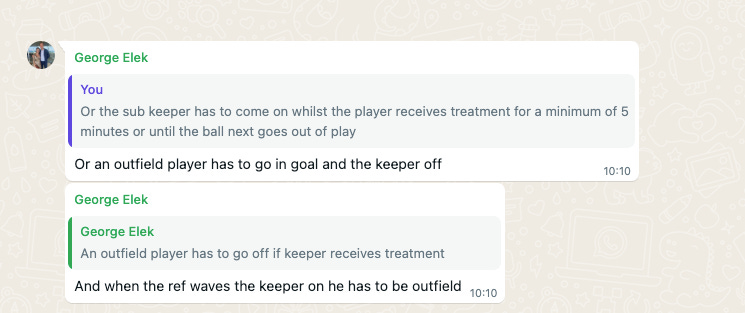Don't 'keeper a good man down
The method in the madness of momentum-killing stoppages, and how and why it's time to act – goalkeepers, be warned.
A spectre is haunting the EFL — the spectre of fake goalkeeper injuries (FGIs). But what is to be done?
The method in the madness
Method actors have given us some of the most compelling performances in the pantheon of the performing arts. The technique, one in which an actor strains physically and mentally to embody a character until they reach a point of total emotional identification, can be quite full-on.
Marlon Brando stuffed cotton wool balls in his gob to create the iconic mumble-patter of Don Corleone. Christian Bale lost a life-threatening amount of weight for his part in The Machinist. During preparations to play the 16th President of the United States of America, Daniel Day-Lewis became Abraham Lincoln, subjecting those around him to a fortnight of calling him Mr President, and that’s mild compared to his behaviour on set whilst the filming of Last of the Mohicans where he refused to eat anything he had not personally killed. No example is quite so extreme as FGIs.
Football clubs are deploying maddening methods to waste time and kill momentum. Following a rehashed script with a cliched antagonist, the tale is as old as time — game after game, wasted minute after wasted minute. May the farce be with you…
EXT. FOOTBALL STADIUM - 16.30 Late afternoon, the away side is losing 1-0, but they are in the ascendency and have a corner in the 80th minute. As the ball is swung into the box, the GOALKEEPER rises highest to claim it. He brings the ball to his chest and, ever the winner, gravity drags him back down to earth. As he hits the ground he crumples in stages: to his knees, on all fours, and then prostrate against the turf.
Burley centre-forward [winces]
Diminutive winger [shakes his head in faux outrage]
Over animated full-back [charges in, spewing incomprehensible complaints at the referee]
Experienced defensive midfielder [gestures theatrically towards the bench]
Referee [waves on the medical staff]
Medical team [rushes on, carrying their kit bag]
Goalkeeper [writhes]
Opposition manager [taps his watch]
Speedy winger [hydrates on the sidelines]
Home manager [delivers advice to the attacking midfielder]
Goalkeeper [slowly gets off the floor, moving into a seated position]
Medical Staff #1 [rummages through their bag for an ice pack]
Medical Staff #2 [rummages through their bag for a laugh]
Centre-back [ruffles the keeper’s hair]
Away fans [with irritation] —YOU DON’T KNOW WHAT YOU’RE DOING
Home fans [with glee] —WAAAAAAAAAAY
Substitute Goalkeeper [motionless on the bench]
Medical Staff #1 [zips up his bag]
Goalkeeper [stands up tentatively]
Referee [gesiticulates for them to get on with it]
Goalkeeper [gingerly walks towards the post, taps his heel against the upright]
All players [take positions]
Goalkeeper [collects the drop ball and blasts a long punt upfield]
The end result? The plain lie, the cheat’s trick, the shithouser’s manipulation, the cunning ploy, the over-trodden path, the well-timed breather, the momentum-pauser, the time-waster, the rehearsal, the method, and the madness wrapped into one. Fool me once shame on me. Fool me twice—now I’ve got to hand it to you: there’s an art to this, not a fine art, but an easy one, and why has it become so easy?
In a low-margin sport, we shouldn’t be surprised that teams will always look to gain an advantage by gaming a system of perverse incentives. There’s a reason offsides were introduced and back passes made illegal. Today the introduction of the 30-second rule for injured outfield players has created one such perverse incentive for goalkeepers. They simply go down, stay down, and kill momentum. It’s a natural development in the craft of time-wasting and one for which the actor is rarely ever penalised. No win, no fee. The beauty of it lies in simplicity. The ugliness; reality. And yet, what can be done?
How to ‘keeper good man up
In our NTT20.COM WhatsApp group, we brought our brains together for at least ten minutes but no longer than fifteen to devise creative solutions to the problem. Here I present them:
A stop-clock solution?
It may not prevent the goalkeeper from killing momentum, but a stop-clock would ensure that no time could be killed. When the ball is dead, the watch is stopped. Simple. Easy. Sorted. But no… A stopped watch is wrong more than twice a game. How do you take a quick free-kick? How do you take a speedy throw-in? A stopped clock would slow everything down, killing the pace of the beautiful game. And if anything, given ball in-play times are around 66% of the full ninety minutes, a stop-clock would most likely advantage the teams with the biggest pockets and deepest squads. That’s a Pandora’s Box on the scale of VAR.
The 5-minute rule?
How about adding 5 minutes of time added on for every time the medical staff enter the field of play? This makes a lot of sense, reducing the incentive for goalkeepers to go down and stay down. Not just the goalkeeper, but any player. Why of course! That’s the ticket. But what happens when the losing team keeps calling on their medical staff to generate a wealth of extra time? Oh yeah, scratch that.
The Restart Penalty
If part of the problem is the pausing of momentum, then why not return to sender? After the goalkeeper is treated, the ref could give the ball back to the opposition stopper? Aha. Now that’d throw a cat amongst the pigeons. A cat with trimmed claws and filed fangs, though. Whilst it would soften the blow and return possession to the other side, it would not necessarily prevent FGIs in the first place, and worst of all, it would bring a new perverse incentive into play: hurt the ‘keeper and keep the ball. Back to the well.
A forced substitution?
Here we are, force the hand. When a goalkeeper goes down injured, they immediately have to be replaced by the substitute goalkeeper for a minimum of five minutes or until the ball next goes out of play, whichever is longer. If the goalkeeper really is injured, they can get the treatment they need without the game lapsing into lengthy stasis. It’s almost like a concussion substitution. Fans would love it. Yeah, but managers and players would not. Once again, this would benefit teams with bigger and better squads. Also, if there is a real injury and not an FGI, then why should a team be penalised for what might have been a foul? It simply wouldn’t fly.
How about “Elek’s Law”?
What a spectacle! Reverse the perverse incentive into the benign effect by creating total parity within the pre-existing 30-second rule. Whenever ANY player is injured and requires medical intervention, force them to leave the field of play for 30 seconds, including the ‘keeper. Short of a goalkeeper, the opposition manager has the choice to make a substitution or put an outfield player between the sticks until the 30 seconds are up. Whoa there! That’s the incentive killer. But even still, the time it would take for an outfield player to don the gloves and the goalkeeper’s jersey might slow the game down to new levels of snail-paciness. And again, it’s difficult to imagine a world where players and managers support the change.
You want the truth? You can handle it.
As much as we bemoan these antics when they count against us, a goalkeeper who doesn’t milk every second when their team is ahead is, in some respect, not doing their job. Call it the dark arts if you will, but the scene takes place in the light. It happens to every team and every team does it. That isn’t to say it’s right, only that we - as fans - are somewhat complicit.
It is insufferable when an opponent pauses your team’s momentum through an FGI. But the solutions are fraught with mission creep and unintended consequences that may be worse. Every rule change has its discontents. The five-sub rule, for example, plainly has greater benefits for the haves rather than the have-nots. The least you can say about the proliferation of the FGI is that it’s somewhat universal.
Still, I’m sure most fans agree that it’s about time rule-makers intervened. Because this particular show is getting boring now. The season has been allowed to run for too long. The script is a hackneyed version of the last one—few of us want to tune in.
The script is helpful though, because it proves that there is a pattern, a trend, an observable loophole that must be closed. It’s method, darling. When Dustin Hoffman told Sir Laurence Olivier that he’d spent three days and three nights, short on sleep and high on adrenaline getting into character, Olivier replied with a piece of advice that rule-makers should heed:
“My dear boy, why don’t you try acting?”





My solution is quite radical, but I think it would work.
With so many matches now filmed by multi camera OBs, perhaps all of these incidents could be looked at in detail, post match, to see if there had actually been any sort of contact with the goalkeeper.
In fact, this could be extended to outfield ‘head injuries’, which are also used as a time wasting method because the referee has to stop play when one is claimed.
So what I suggest is that the EFL has a team that examines these instances, and when they find that there *is* evidence of fakery, the player involved receives a three match ban. Perhaps even a points deduction for the club in extreme cases, for example when the match result leads to that club reaching the playoffs.
We have this conversation pretty much every week, about how to stop it
I think the referee should just start booking them earlier
They do it most games and some are doing it inside the first 5 minutes, but don’t get booked until the last 3, and even though we know they won’t send him off with repeatedly doing it
if they keep doing it on a regular game basis, it won’t be long before they get banned under the totting up process